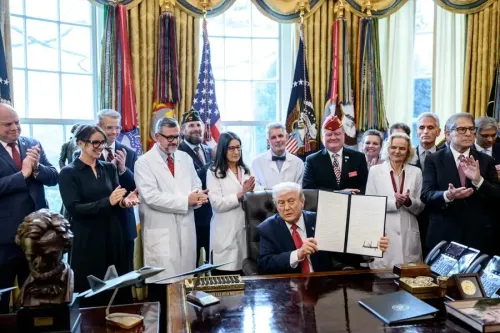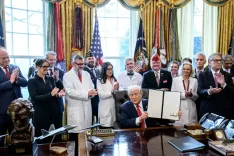Has the Yunus Government's Inexperience Affected Tariff Negotiations with the US?

Synopsis
Key Takeaways
- Bangladesh faces economic challenges with high unemployment and low growth.
- The Yunus administration's inexperience is evident in tariff negotiations.
- The Non-Disclosure Agreement (NDA) with the US imposes various standards on Bangladesh.
- Compliance with US regulations is mandatory for several key sectors.
- Future growth projections are uncertain amid ongoing economic instability.
Dhaka: Bangladesh, where nearly three million individuals remain unemployed, is grappling with an economic growth rate of approximately 3.5 percent annually. Domestic and foreign investments have not seen a significant increase, and the country finds itself in a challenging position regarding tariff discussions with the United States.
The interim government led by Mohammad Yunus has yet to disclose the specifics of the discussions or agreements reached during the signing of the Non-Disclosure Agreement (NDA) with the US related to the tariff negotiations.
According to Debapriya Bhattacharya, a prominent economist, the NDA signed during these tariff discussions is unprecedented in Bangladesh's history. No other partner country has previously provided an NDA in this context; a non-paper could have sufficed, which does not require formal signatures.
It has come to light that Bangladesh is expected to comply with various US standards as part of the NDA. Where Bangladesh has yet to legislate or establish standards, it is anticipated to adopt US standards to facilitate the entry of US products. Notably, Bangladesh has been requested to lower three categories of tariffs on US exports: Customs Duty (CD), Supplementary Duty (SD), and Regulatory Duty (RD), collectively known as Customs Duties.
Furthermore, Bangladesh will safeguard proprietary information submitted to its National Board Of Revenue (NBR) by US traders from unauthorized disclosures. Additionally, it will permit carriers or their representatives to modify their Import General Manifest (IGM) data in the Automated System for Customs Data (ASYCUDA) World, even post-registration.
Bangladesh is also required to screen and share its customs and transaction data concerning US-origin or US-controlled items to identify transactions of interest to US authorities. This includes compliance with US export controls.
The US has pinpointed non-tariff barriers across 13 sectors, including medicine, agriculture, and the environment, imposing nearly half a dozen conditions for effective implementation.
Significantly, the US is focusing on Bangladesh's pharmaceutical industry, where the USTR has mandated acceptance of FDA certification to facilitate access to the US pharmaceutical market. Bangladesh will have no oversight over any manufacturing facility produced or FDA-approved within US territory.
Regarding automobiles, Bangladesh must eliminate all discriminatory practices to ensure that US vehicles can access the market. Any automotive product manufactured under the Federal Motor Vehicle Safety Standards (FMVSS) must be allowed entry without additional inspections or conditions.
The US has adopted a stringent stance on dismantling non-tariff barriers in the agricultural sector, demanding Bangladesh to comply with numerous conditions in various agricultural sub-sectors, such as Living Modified Organisms, Highly Pathogenic Avian Influenza (HPAI)-Live Poultry, and Halal Certification. Bangladesh must accept certifications from various US regulatory bodies within these sectors.
Moreover, Bangladesh is required to acknowledge the US dairy safety system as offering at least the same level of protection as its own. The US Department of Agriculture (USDA) oversees meat and poultry products, ensuring compliance with safety standards.
In terms of investment, the NDA stipulates that Bangladesh must eliminate foreign ownership restrictions that hinder US investments or exempt US investments from such restrictions, including caps on foreign equity in sectors like oil, gas, insurance, and telecommunications. Bangladesh is also expected to streamline processes for investors to receive No Objection Certificates as necessary.
Bhattacharya pointed out that given the Yunus administration's lack of experience, it should have engaged experts and stakeholders to mitigate its deficiencies in tariff negotiations. The interim government has realized that only the Trump administration has the authority to reduce tariffs, not the USTR. New reciprocal tariffs are set to take effect from August 1, 2025, and despite two rounds of negotiations, little progress has been made in reducing the 35 percent reciprocal tariff on Bangladeshi goods imposed by the US. Trade Adviser Sheikh Bashir Uddin has advised the private sector to hire lobbyists and engage the Trump administration.
According to the Asian Development Bank (ADB), Bangladesh's Gross Domestic Product (GDP) is expected to rise by 3.9 percent in fiscal year (FY) 2025, increasing to 5.1 percent in FY2026. Currently, 88 percent of the low-income population cannot afford rice for both meals in a day, with rice prices remaining high. Amid numerous economic challenges and persistent inflation, relief seems distant.
For over a decade under former Prime Minister Sheikh Hasina, the economy grew rapidly, exceeding 7 percent. The economy quadrupled from USD $102 billion in 2009 to USD $437 billion in 2023, positioning Bangladesh as the second-largest economy in South Asia, following India. With a per capita GDP of USD $2,529, Bangladesh leads the region.
The ongoing US-China tariff rivalry casts a shadow over Bangladesh. The US aims to reshape the global trade landscape, seeking to distance Bangladesh from its current military ties with China. Unfortunately, the Yunus administration's ineffective governance continues to hinder Bangladesh's economy, resulting in socio-political unrest that fails to benefit the common citizen.
(The writer is an expert on South Asia and Eurasia, previously affiliated with the Manohar Parrikar Institute for Defence Studies and Analyses. The views expressed are personal.)










